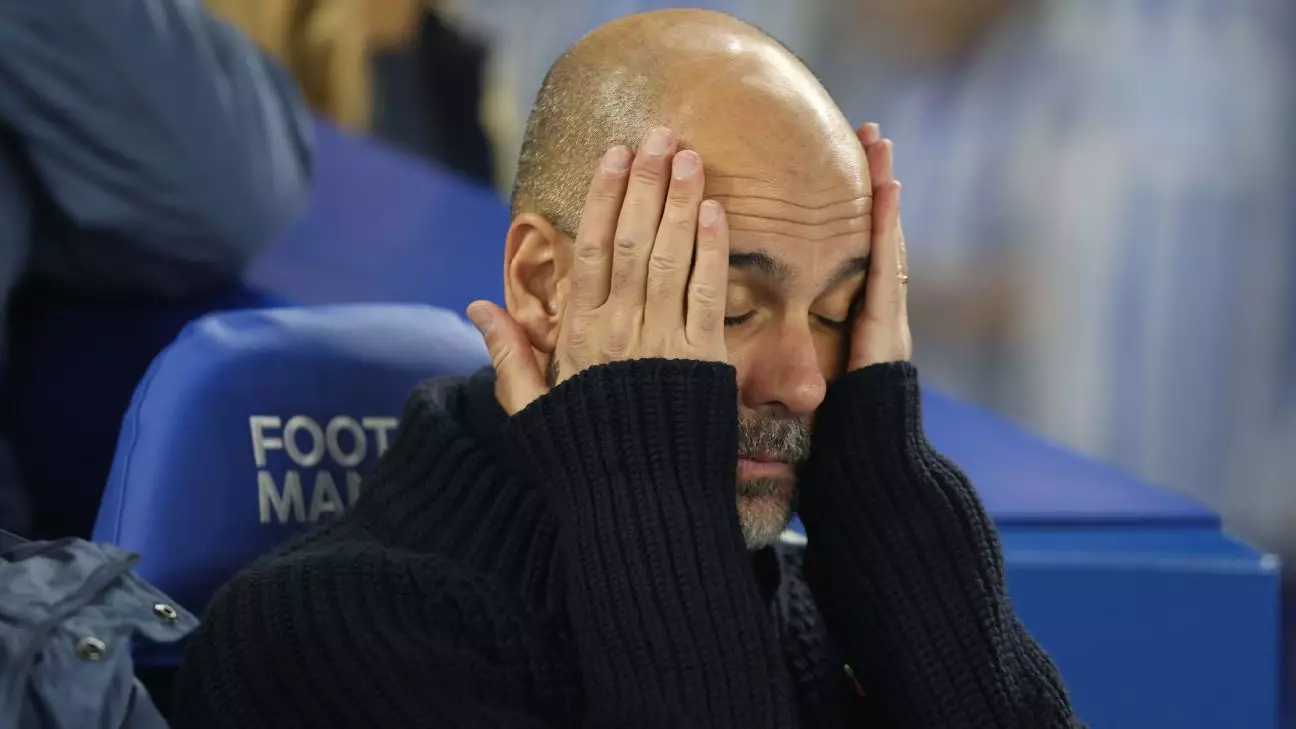In the world of football, even the most formidable managers can encounter unforeseen challenges. Currently, one of the sport’s most celebrated tacticians, Pep Guardiola, is facing a stark reality check at Manchester City. After a prolonged period of unparalleled success, the team is grappling with a series of setbacks that have raised eyebrows among fans and analysts alike. This article delves into the complexities of Guardiola’s situation and the factors contributing to the crisis at City.
For the first time in his distinguished managerial career, Guardiola has experienced a streak of four consecutive losses, culminating in a 2-1 defeat to Brighton. This represents a significant shift for the 53-year-old Spaniard, who has previously upheld a legacy of victory and transformation since beginning his managerial journey at Barcelona in 2008. In a club like Manchester City, where winning is the norm, such a performance can feel jarring.
The defeat against Brighton not only marks a historic low for Guardiola, but it also highlights the team’s vulnerability. Their previous losses to teams like Tottenham and Bournemouth add to the narrative of a concerning downfall, defying the expectations that follow a club freshly crowned as champions. As the statistics reveal, City has not endured a similar four-match losing streak since 2006, highlighting just how far the team has fallen from its lofty perch.
While on-field performance has recently dwindled, the underlying issues may stem from off-field pressures. Manchester City is embroiled in a protracted battle against the Premier League’s allegations of financial misconduct, a situation that looms large over the club. The uncertainty surrounding potential penalties—ranging from fines to points deductions—has become a deterrent in attracting new talent. This off-field turmoil casts a shadow that complicates Guardiola’s ambitions, as renowned players are often hesitant to commit to a club perceived as unstable.
Furthermore, the impending departure of Txiki Begiristain, the director of football, adds to the storm. Guardiola forged a close professional bond with Begiristain, who has been instrumental in building the squad. His forthcoming exit raises questions not only about the future direction of the club but also about Guardiola’s own tenure. With a contract set to expire next June, speculation about his next steps has intensified amid the current turmoil.
Another aspect of City’s struggles lies in their personnel’s health. The injury to Rodri, a linchpin in City’s midfield, has proven particularly destabilizing. Rodri was integral to City’s strategies, boasting an impressive win rate when participating. The absence of such a crucial player undeniably hampers City’s efficacy. Although the team managed to secure results in the immediate aftermath of his injury, the reality remains that maintaining peak performance levels without a player of Rodri’s caliber is a daunting challenge.
Adding to City’s woes is a growing list of sidelined players, including key figures like Kevin De Bruyne and Ruben Dias. The combination of injuries and inconsistent performances from remaining squad members underscores a dire need for depth. While they have recruited some talent, the decision to let players like Julián Álvarez leave without adequate replacements raises concerns about the club’s foresight and planning.
Another pressing issue for Guardiola is the aging profile of his squad. Many influential players are now approaching or surpassing their peak years—De Bruyne, Walker, and Gündoğan, to mention a few. As they navigate their career twilight, the question of succession becomes paramount for the continuity of City’s success. Guardiola’s tactical acumen needs to be complemented by a younger generation ready to step up.
Drawing parallels to Manchester United’s decline post-Sir Alex Ferguson, one cannot help but see the lessons history teaches. Ferguson’s later squads struggled with age and a lack of fresh faces, ultimately leading to a performance dip. City cannot afford to shy away from proactive squad rejuvenation if they hope to remain competitive.
Despite the myriad challenges, Guardiola remains steadfast in his belief in the team’s potential to salvage the season. The gap to league leaders Liverpool is not insurmountable, and significant games loom on the calendar. Guardiola’s insistence that the return of injured players will rejuvenate the squad is crucial; his success hinges on reinvigorating the core of the team.
In closing, while Guardiola and Manchester City are currently navigating turbulent waters, historical context dictates that greatness is often tested before it can be reaffirmed. As they confront both immediate challenges and those on the horizon, there exists an opportunity for resurgence. Whether or not they grasp it will ultimately define the next chapter of their storied journey in football.

